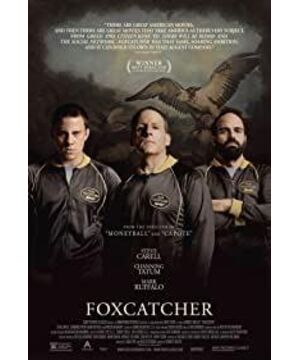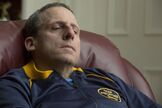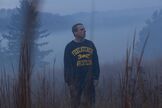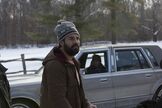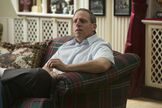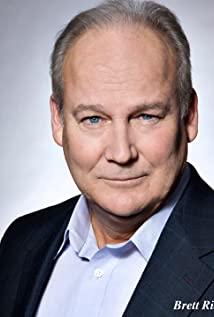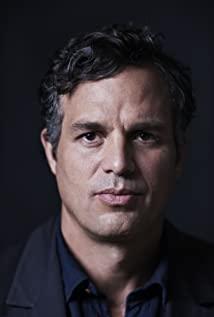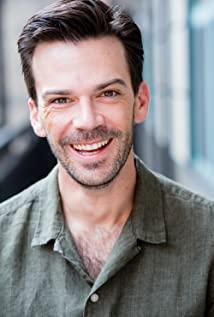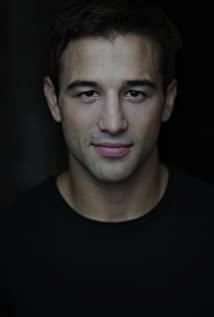The core difference is that in history, the three of Mark, Dave and DuPont have never appeared together on the "Fox Hunter" farm! The real timeline is: DuPont first extended an invitation to his older brother Dave around 1986, and Dave recommended his younger brother Mark, because Mark had just been dismissed from Stanford University and lost his job as a teaching assistant. Mark spent only two years on the "Fox Hunter" farm, and left in 1988 because he couldn't bear the dullness of DuPont's extreme self-personality. Instead, Dave and his family moved into the farm since 1989 and lived there until the beginning of 1996 when he was killed. At that time, the "Fox Hunter" farm was one of the training camps for the American Wrestling Team to prepare for the Atlanta Olympics. Dave himself was both a team member and a wrestling coach hired by DuPont.
The film overlaps the original separation of the Schultz brothers and DuPont, and is set between 1984 and 88, which arouses a strong theatrical conflict between the three and leads to the final tragic ending. According to the narrative clues provided by the film, DuPont’s motive for killing is clear: a billionaire who cannot be recognized by his parents, is keen to fund wrestling, and his essence is to have a group of athletes who are attached to himself in order to obtain pathological psychological satisfaction. He had the opportunity to devour Mark spiritually, but was invisibly defeated by Dave, who has a healthy personality, and finally became angry and murdered. This context is too in line with the temperament of Hollywood unpopular movies: the characters are billionaires and Olympic champions, the scene is the killing of closed private estates, and the theme involves both bloody real cases and the niche wrestling world. The root is Morbid personality and the same-sex complex that seems to exist or not...
However, since the three of them have never been together in history (Mark had been away from the farm for 6 years when DuPont shot Dave in 1996), the whole clue given in the film is just its own logic and has nothing to do with reality. Then we will naturally ask, what is DuPont’s motive for killing in reality? Dave was killed on the spot, unable to give his own judgment. DuPont was arrested after confronting the police for two days. He was found to be "mental" in the court trial and sentenced to 13 to 30 years in prison for third-degree murder. He died in prison in 2010. It is unknown whether the "mental disorder" is a fact or the reason that DuPont and its lawyers have compiled to escape severe punishment. There are two pieces of information for everyone to infer: First, Dave, not Mark, is the true close friend in DuPont's life. Dave originally planned to accept a faculty position at Stanford University and leave the Fox Hunter Farm after the 1996 Olympics, which made DuPont very dissatisfied. Second, DuPont has always been a "dangerous person." He was married in 1983, but the marriage lasted only 90 days, and his wife felt that her life would be in danger if she did not leave: DuPont tried to stabbing and strangling her, pushing her into a fire and a fast-moving car... The abuse of alcohol and drugs has made DuPont's mood more and more unstable, and he is indeed inseparable from the gun as described in the movie. Just at the moment the shot was fired on January 26, 1996, did DuPont wake up or fall into a trance? It remains a mystery, perhaps forever.
Many of the characters involved in "Fox Hunter" are still alive, and many people must be concerned about how they view this movie. As one of the protagonists of the film, the archetype Mark has a rather ambiguous attitude. On the one hand, he himself participated in the filming, playing the role of the referee who measured the weight of "self" before the trial. On the other hand, he was extremely disgusted with the vague expressions of DuPont and "self" homosexuality in the film, and called it on Facebook. "Disgusting and insulting lie", said "hate director Bennett Miller", but soon afterwards Mark publicly apologized to Bennett, believing that he is the greatest director in history, nominated for three consecutive Oscars. It deserves its name, but this film makes me feel very emotional, and it is difficult to face for a while. Dave's widow, Nancy, not only agreed to the filming, but also provided a lot of real props. For example, the glasses worn by Dave in the film are the relics of her husband. As for the DuPont family, the director Bennett said that he did not encounter any resistance from the beginning to the end. He did meet with some family members. They were all very large. Of course, the premise is that Bennett believes that he does enough. After studying homework, it is clear where the limits of the law allow and prohibit.
"Fox Hunter" itself is a masterpiece of restraint and texture. If you compare it with the real events behind it, I believe you will get more fun and memorable things like me.
View more about Foxcatcher reviews


